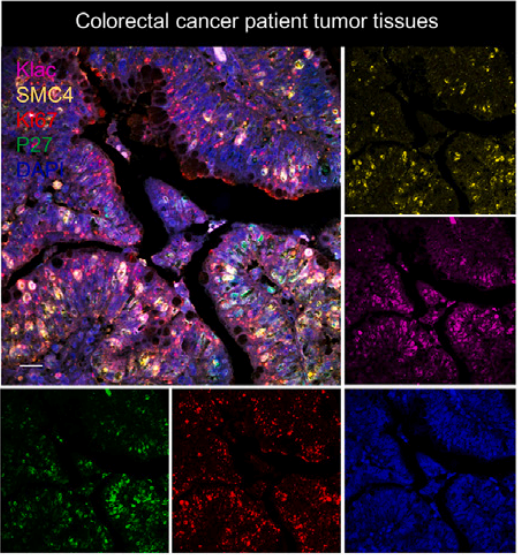- Cart 0
- English
SMC4 Downregulation Induces Quiescent CRC Cells with Low Proliferation and Chemoresistance
February 08, 2025
Clicks:352
Diapause is a type of quiescent state induced in animals by environmental conditions. It typically occurs at certain stages of development, is relatively stable, and is characterized not only by the suspension of morphogenesis and a decrease in physiological activity but also by the necessity to pass through a certain phase or undergo some physiological change before it can be terminated. Animals regulate the timing of growth, development, and reproduction through diapause and similar, but less stable, dormancy phenomena to adapt to seasonal changes in their region. On January 7, 2021, Canadian researchers published a research paper titled: "Colorectal Cancer Cells Enter a Diapause-like DTP State to Survive Chemotherapy" in the journal Cell. The study indicates that when cancer cells are threatened (e.g., by chemotherapy), they enter a slow-dividing "dormant state," which is similar to the diapause phenomenon in animals. During this state, the metabolism of cancer cells is significantly reduced, and autophagy is activated, allowing them to survive without other nutrients by breaking down their own proteins or other components.
On August 4, 2023, the research team led by Professor Liu Lianxin from the First Affiliated Hospital of University of Science and Technology of China, in collaboration with the team led by Professor Wu Mian from the Medical Science Institute of Zhengzhou University, published a research paper titled "The diapause-like colorectal cancer cells induced by SMC4 attenuation are characterized by low proliferation and chemotherapy insensitivity" in the Cell journal's sub-publication Cell Metabolism. The study revealed the key factor SMC4 that regulates the diapause-like state of tumor cells, providing new insights into the non-genetic mechanisms of chemotherapy resistance, enhancing the understanding of aerobic glycolysis in tumors, and potentially offering references for future therapeutic strategies.

Graphical abstract

Multiplex fluorescence immunohistochemical staining results of colorectal cancer tissue (abs50013).
-
SMC4 is a negative regulator of the diapause-like state in colorectal cancer cells;
-
SMC4 attenuation induces low proliferation and chemotherapy insensitivity in diapause-like cancer cells;
-
Diapause-like cancer cells increase the transcription of ABC transporters by promoting histone lactylation;
-
The loss of cell motility in diapause-like cancer cells is due to the reduction of F-actin assembly mediated by PGAM1.
References
[2] Sun X, He L, Liu H, Thorne RF, Zeng T, Liu L, Zhang B, He M, Huang Y, Li M, Gao E, Ma M, Cheng C, Meng F, Lang C, Li H, Xiong W, Pan S, Ren D, Dang B, Yang Y, Wu M, Liu L. The diapause-like colorectal cancer cells induced by SMC4 attenuation are characterized by low proliferation and chemotherapy insensitivity. Cell Metab. 2023 Sep 5;35(9):1563-1579.e8. doi: 10.1016/j.cmet.2023.07.005. Epub 2023 Aug 4. PMID: 37543034.
|
Catalog No. |
Product Name |
Specification |
|
Absin 4-Color IHC Kit (Anti-Rabbit and Mouse Secondary Antibody) |
20T |
|
|
Absin 4-Color IHC Kit(Anti-Rabbit Secondary Antibody) |
20T |
|
|
Absin 5-Color IHC Kit (Anti-Rabbit and Mouse Secondary Antibody) |
20T |
|
|
Absin 5-Color IHC Kit (Anti-Rabbit Secondary Antibody) |
20T |
|
|
Absin 6-Color IHC Kit (Anti-Rabbit and Mouse Secondary Antibody) |
20T |
|
|
Absin 6-Color IHC Kit (Anti-Rabbit Secondary Antibody) |
20T |
|
|
Absin 7-Color IHC Kit (plus) (Anti-Rabbit Secondary Antibody) |
20T |
|
|
Antibody eluent (for mIHC) |
30ml |
Absin provides antibodies, proteins, ELISA kits, cell culture, detection kits, and other research reagents. If you have any product needs, please contact us
|
Absin Bioscience Inc. |
 Follow us on Facebook: Absin Bio Follow us on Facebook: Absin Bio |
